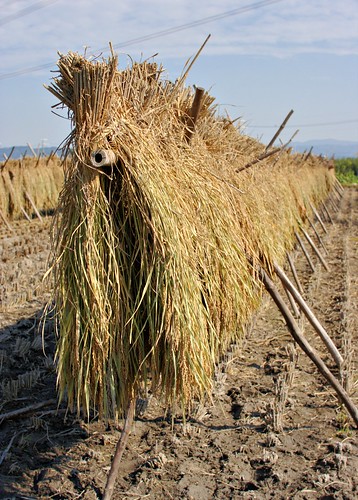 Japan has to import some specified amount of rice every year as part of various trade deals; that yearly quota technically fulfils promises to "open up" the domestic rice market. Little of that rice is ever sent directly out into the public food market, though. In order to protect the domestic rice industry most of the imported rice is used in industrial food processing, stored as an emergency reserve or diverted for industrial use - making glue, paper coatings and such things. Of course, if the rice is not being used for human consumption it'd be a huge waste to buy expensive high-grade rice. A fair amount of the imported rice is contaminated with pesticides, mouldy, toxic or otherwise unfit for human consumption.
Japan has to import some specified amount of rice every year as part of various trade deals; that yearly quota technically fulfils promises to "open up" the domestic rice market. Little of that rice is ever sent directly out into the public food market, though. In order to protect the domestic rice industry most of the imported rice is used in industrial food processing, stored as an emergency reserve or diverted for industrial use - making glue, paper coatings and such things. Of course, if the rice is not being used for human consumption it'd be a huge waste to buy expensive high-grade rice. A fair amount of the imported rice is contaminated with pesticides, mouldy, toxic or otherwise unfit for human consumption.And now, it turns out that, first one, then two, then three and now four rice wholesalers have been buying up such toxic rice very cheaply, then mixed it with food-grade rice and sold it on to other companies for human consumption. The list of unwitting buyers are at least 377 as of this morning just from one of these importers, with a total of at least 4000 tons of contaminated rice. I'd expect all these numbers to continue to grow over the next week or so as more fraud is uncovered.
As Jun Okumura points out, this is a little different from most earlier recent food scandals: it is domestic in origin, not foreign (unlike the recent tainted gyouza scandal), and it is not just a regulatory breach like ignoring best-before dates or mislabelling products. Rice with more than twice the maximum allowable levels of pesticides have been found in schools and hospitals, and it's certain that people, both children and hospital patients, have eaten the contaminated rice.
An amusing political wrinkle (for some value of "amusing") is that it was a MAFF (the Ministry of Agriculture, Fisheries and Forestry) official that first introduced the rice seller to the cheating rice importer; that's the same ministry that's supposed to police this kind of thing, but were completely blindsided by this due to inadequate inspection routines. Companies are supposed to police themselves, and "surprise inspections" to police them are infrequent and announced well ahead of time. It doesn't help their image that one MAFF official in charge of rice sales was wined and dined by one of the offending companies, against ministry regulations. I wish I could say this creates a cloud of doubt over MAFF and the Japanese state bureaucracy, but the scandals have been so many and so outrageous in recent years that I believe the actual fallout will be small. The social security agency established whole new levels of incompetence with the unfolding pension scandals, and MAFF itself (an organisational basket case) is already known for siding with the agricultural industry over the Japanese consumers. This level of mishandling is simply expected, and will not materially change the ministry's standing among the public.
And this food safety scandal ties in with something I've gradually come to realize: Japanese cuisine is truly excellent, but Japanese produce, by and large, is not. Yes, there's some really good fruits and vegetables out there (we get some wonderful, juicy apples from Aomori every year), but those are exceptions - and usually expensive exceptions, sold as sought-after local specialities - in a sea of rather mediocre products. Not really bad or anything - perfectly usable - but indifferent, and certainly not deserving of the high prises and high praise they command. I have to wonder just how broken this system is when a producer in sub-arctic northern Sweden with nothing like the level of subsidy a Japanese farmer receives can produce vegetables as good at half the price or less of a producer in one of the most fertile areas of the world.
The only reason the Japanese agricultural industry gets away with selling second-rate products at premium prices in this way is the strong, persistent local myth of the absolute superiority of Japanese produce. If that image is shattered, due to continuing food safety scandals for instance, then this unconditional support for Japanese agriculture will erode. This is something the agriculture industry and Ministry of Agriculture is acutely aware of, and that is why imported rice is not allowed in stores and supermarkets, for instance: they desperately want to avoid consumers making a direct comparison and discovering that the Japanese product is no better than the imported one.

No comments:
Post a Comment
Comment away. Be nice. I no longer allow anonymous posts to reduce the spam.